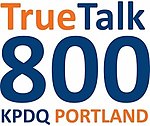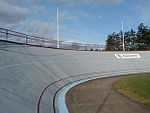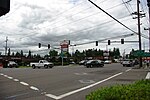Alpenrose Dairy is a dairy and home delivery company located in the Hayhurst neighborhood of southwest Portland, Oregon, since 1916. It was owned by the Cadonau family for several generations until being sold to Smith Brothers Farms, a family-owned dairy located in Kent, Washington, in August 2019.The brand was named after the alpine rose (Rosa pendulina) by the Swiss-born wife and early co-owner of the dairy. Alpenrose is a "supplier of dairy products to retail, wholesale and ingredient customers in Portland and throughout the Northwest". In 2020, addressing the growing demand for delivery services the company introduced Alpenrose Home Delivery, a weekly grocery delivery service that provides customers with Alpenrose brand dairy products and other locally-made grocery items. Deliveries are facilitated by the company's fleet of milkmen and milkwomen, who deliver groceries by neighborhood and are unique to the service.The 52 acres (21 ha) grounds of the dairy include:
Circuit d'Alpenrose, a velodrome, one of only 25 such tracks in the United States. The track was built to host the 1967 National Championships. At 268.43 meters around with a 16.6-metre (54 ft) radius and a 43-degree bank, Alpenrose is one of the steepest velodromes in the country. Alpenrose is home to the only North American Six-day race. It hosts races all summer, and annually draws the largest velodrome crowd in North America for the Alpenrose Challenge, in mid-July.Alpenrose Field, the site of baseball and softball games, including Little League Softball World Series games, from 1956-2019.
Dairyville, a replica of a western frontier town, with false-front shops, a doll museum, an ice cream parlor, a harness-maker's store, a music shop, and a 600-seat opera house with a pipe organ (with 4000 pipes).
A quarter-midget racing arena.Products from Alpenrose include milk, ice cream, eggs, and various cultured dairy products.







